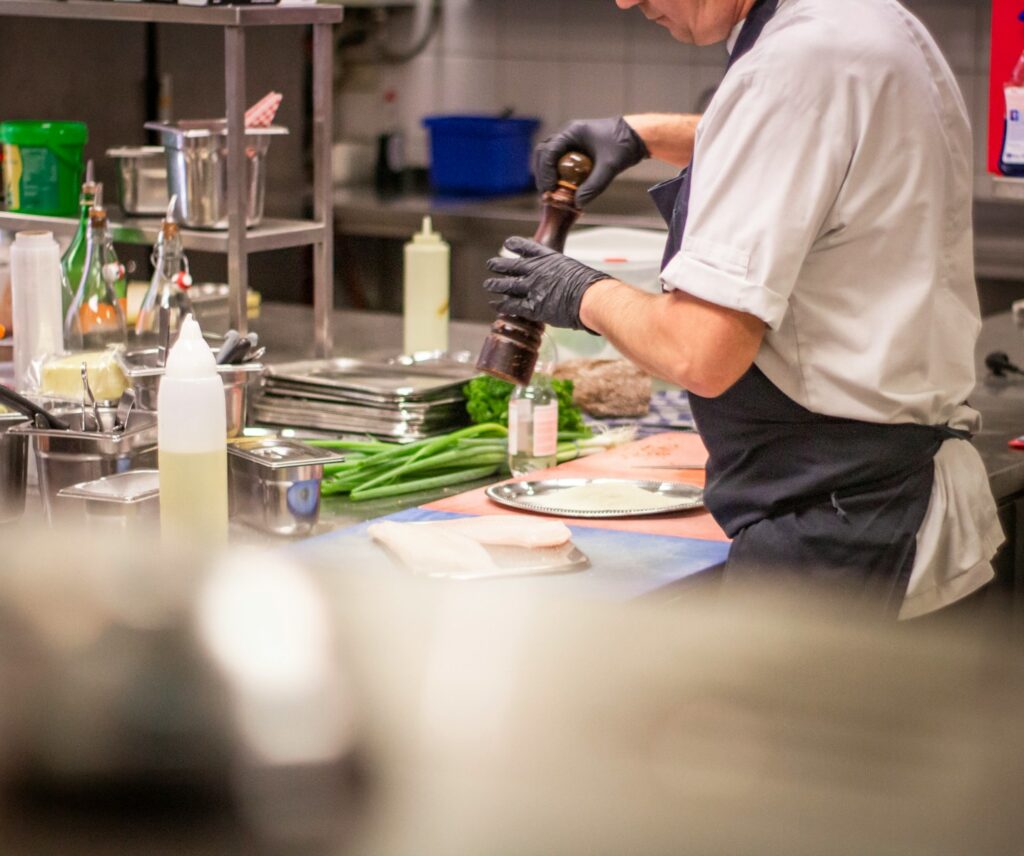
We all adore a fantastic meal out, don’t we? Or that quick, satisfying stop at the local deli for a sandwich that just hits differently. These places aren’t just about food; they’re where memories are made, hunger is vanquished, and sometimes, even impromptu celebrations bubble up. Behind every perfectly plated dish, every expertly sliced piece of charcuterie, and every refreshing drink, there’s a dedicated service worker, busting their chops to make your experience as smooth and enjoyable as possible. They truly are the unsung heroes of our culinary adventures, bringing warmth and flavor to our everyday lives!
Now, let’s get real for a sec. While most interactions are pure gold, and customers are generally lovely, sometimes even the sweetest server or the most patient deli clerk faces a few, shall we say, *quirks* from patrons that make them want to pull their hair out. We’ve all been there – maybe we didn’t even realize we were doing it! But just imagine spending hours on your feet, juggling multiple orders, and interacting with hundreds of different personalities every single day. You start to notice patterns, those little things that, when they pile up, can seriously grind your gears.
So, in the spirit of fostering a little more understanding and making everyone’s day a tad brighter (and perhaps saving some poor soul from an “immense rage” moment behind the counter), we’ve curated a definitive list of 11 things service workers – from your ever-helpful deli slicers to your tireless waitstaff – really, truly wish you’d stop doing. Get ready to chuckle, maybe cringe a little, and hopefully, re-evaluate your own habits. Trust us, embracing these tips is for the greater good, leading to happier workers and even better service for you!

1. **The Phone Call Counter Attack**Picture this: you stride up to the deli counter, phone glued firmly to your ear, completely engrossed in a vibrant conversation. The worker, ready to assist, greets you with a friendly smile, pad and pen poised, or hand hovering over the slicer. What often ensues is a vague gesture towards the display, an almost imperceptible eye roll, or even a raised finger signaling “pause” to the very person whose job it is to serve you right now. It’s a common scene, and it’s one of the biggest pet peeves in the book.
This isn’t just a minor annoyance; it’s a frustrating bottleneck for everyone involved. As one industry pro vividly put it, “If you stride up to the deli counter, gesture vaguely at the coleslaw, and make angsty eyes at the attendant whilst neck-deep in a phone conversation then you—yes, you—are an ass. Moreover, you’re wasting everyone’s time.” The worker is left guessing, trying to interpret your non-verbal cues while you’re focused elsewhere, extending a transaction that should be quick and seamless. It significantly slows down the entire line, inadvertently penalizing not just the dedicated staff, but also every other hungry soul patiently waiting behind you.
The impact is tangible: delayed service, increasing stress levels for the employees, and a ripple effect of impatience throughout the establishment. It’s hard to provide excellent service when the customer isn’t fully present in the interaction. You might think you’re multitasking efficiently, but from the other side of the counter, it simply comes across as dismissive and disrespectful of their time and effort.
The simple, elegant fix? Just put the device down for a moment! If your selection truly requires you to consult with someone on the other end, that’s absolutely fine. However, “stand back and let the folks who already know what they want make their purchases in peace.” A quick, polite “one moment, please” to your caller and a focused interaction with the staff can make all the difference in the world. Your conversation can surely wait 30 seconds; your sandwich order, and the queue behind you, perhaps not so much!
Read more about: Beyond the Hype: Unpacking the Myriad Reasons Why Self-Driving Cars May Never Truly Work

2. **The Vague Order Vortex**Ah, the classic “Gimme some potato salad!” Or perhaps, “I’d like that ham,” accompanied by a sweeping, unhelpful wave of the hand, potentially even pointing at something that clearly isn’t ham at all. This is the stuff of genuine service industry nightmares, echoing the frustration of asking for “some liquid” at a bar – what kind? How much? Your server or deli specialist isn’t equipped with telepathic abilities, no matter how skilled they are at anticipating needs. They can’t guess what’s truly on your mind.
This frustrating vagueness immediately plunges the worker into what feels like an unnecessary interrogation. They have to ask, “How much would you like?” and “Which kind would you like?” These aren’t just extra questions; they are, as the experts note, “two added steps in what should be a simple transaction.” It’s not merely about the additional time; it’s about the unsettling feeling of being unhelpful, or worse, being “stare[d] at… with disgust that you are trying to figure out what the mysterious ‘that ham’ could be.” This dynamic is not only inefficient, but it can also feel quite insulting to their professionalism and dedication to getting your order right.
This communication gap isn’t just a minor inconvenience; it’s a recurring theme that can escalate quickly into annoyance for both parties. The worker tries to “coerce a proper answer from them,” often to be met with further unhelpfulness. It creates a stressful environment, especially during busy periods, and prevents them from moving quickly to serve the next customer. The desire for a smooth, efficient exchange is often thwarted by a lack of initial clarity.
So, how can you be a rockstar customer and avoid this vortex? Be specific! Know whether you’re craving the “deli leg ham” or the “roast beef,” and if you need “a pound” or “half a pound.” If you’re genuinely unsure or need a recommendation, that’s absolutely fine, but articulate that need upfront. Lead with questions like “What are your most popular hams today?” or “Could you describe the difference between these two potato salads?” As our experts advise, “If you need help determining type and amount, deli workers can help you with that—but you need to lead with those questions so employees don’t have to draw the order out of you one clarification at a time.” A little clarity at the outset truly goes an immensely long way in making everyone’s day better.
Read more about: Beyond the Mainstream: 14 Unforgettable ’70s Classic Cars That Shaped Automotive History for Enthusiasts

3. **The Slow-Rolling Saga**You’ve finally reached the front of the line, or your server has approached your table. You place your first order. The worker, diligent and efficient, starts to process it, and then – *surprise!* – you suddenly remember another item you needed. And then another. And perhaps just one more, because, well, why not? This is the infamous “slow-roll” – a seemingly endless trickle of requests that transforms what should be a single, streamlined transaction into a drawn-out, fragmented affair. It’s the culinary equivalent of watching paint dry, but with higher stakes for the staff.
For service workers, this piecemeal approach to ordering is a genuine source of dread. As one frustrated individual lamented, “We can hear it in your voice—that upward inflection as you order the first item tells us another request is coming. It hangs there, lacing the air with dread as we wait for the other shoe to drop.” This isn’t just about testing their patience; it’s a critical issue of efficiency and workflow. In a bustling deli or a busy restaurant, every single second is valuable. Consolidating your orders allows staff to manage their time effectively, serve other customers promptly, and keep the entire operation flowing smoothly.
Constantly running back and forth, or having to add items to an order piecemeal, can feel incredibly disruptive. It’s often described as “running your server,” especially when other tables are clamoring for attention or the line at the deli counter is growing. This inefficiency doesn’t just impact your server; it affects the entire team, from the kitchen staff waiting for the full order to the other customers whose wait times are unnecessarily extended. It’s a domino effect of delays that could be easily avoided.
So, what’s the savvy way to handle multiple items? “If you plan to order several items, let the attendant know as soon as you begin.” A simple phrase like “I have a few things I’d like to order” or “I’m going to need a couple of items” can make a world of difference. Even better, for those larger orders – think several pounds of various meats, cheeses, or salads for a party – “your best bet will always be to call ahead.” This thoughtful gesture allows clerks to prepare your order during a less busy period, ensuring you get everything you need without causing a bottleneck or unnecessary stress for anyone involved. It’s a win-win situation for both you and the hard-working crew!

4. **The Unwanted Touch**Take a moment to visualize the glistening deli case in your mind, brimming with an irresistible array of fresh salads, premium meats, and artisanal cheeses. Now, imagine your fingers, instead of staying politely tucked away, deciding to embark on a little adventure of their own. This might involve casually “rub[bing] their greasy hands on your glass window display” while contemplating choices, or, in a far more egregious move, actually reaching over to “take a slice of meat from the stack.” Believe it or not, these behaviors are a major source of angst for deli workers everywhere.
This isn’t just a minor pet peeve; it’s a hygiene nightmare and a blatant violation of established boundaries. Think about the sheer “immense rage welling up when a customer comes up, rubs their greasy hands on your glass window display trying to think what they want?” Beyond the obvious cleanliness concerns, it’s profoundly disrespectful of the meticulously arranged product and the staff’s diligent efforts to maintain a pristine, appealing display. A dirty, smudged glass isn’t just unsightly; it speaks volumes about the lack of consideration for the establishment and its workers.
And then there’s the truly shocking act of reaching into the case. This isn’t just impolite; it’s a serious health code violation waiting to happen, not to mention a potentially dangerous move, especially with razor-sharp slicers often in close proximity. It compromises the safety and integrity of the food for all other customers and demonstrates a complete disregard for the rules designed to protect public health. The staff works hard to ensure everything is fresh and safe, and a careless touch can undo all that effort.
The golden rule to remember here is beautifully simple: “Keep your hands to yourself!” As our deli pros wisely suggest, “Draw an imaginary line through the whole thing lengthwise, and keep yourself on your side.” It’s a fundamental aspect of common courtesy and basic food safety. If you need a closer look, have a specific question about an item, or want to confirm the texture of a cheese, just politely ask the attendant. They are there to assist you, not to have their carefully managed workspace treated like a public petting zoo or a personal tasting station. Respect the glass, respect the food, and most importantly, respect the dedicated people who are serving you.
Read more about: Your Digital Fortress: 12 Google Privacy Settings You Absolutely Need to Tweak Right Now

5. **The Menu Marathon**The critical moment arrives – it’s finally your turn to place an order, whether at a bustling counter or as your server approaches your table. But instead of being ready with a decision, you “get to the front of the line and stare at the menu with your mouth open,” seemingly absorbing the information for the very first time. Or, in a move that leaves many service professionals utterly bewildered, you splay out the menu and then innocently ask the server, “I don’t know. What do you have?” or, even more dauntingly, “choose for them.”
For service workers, who often find themselves “in the weeds, the bar two deep,” this indecisiveness is a significant drain on their precious time and mental energy. Expecting them to become your personal food consultant, without any prior knowledge of your dietary preferences or dislikes, is an unfair burden. As one server articulated the dilemma, “I have no idea what their likes and dislikes are, plus if they order what I say and don’t like it, who is at fault?” This predicament creates an uncomfortable and potentially frustrating situation for everyone involved, as the staff feels pressured to make a choice that might not satisfy you.
This isn’t to say that asking for recommendations is off-limits. Far from it! But there’s a world of difference between asking for a suggestion to help narrow down two choices and asking someone to entirely decide your meal from scratch. The latter implies a lack of preparedness that impacts the pace of service and the experience of those waiting. It essentially passes the responsibility of your dining choice onto an already busy individual.
So, what’s your winning strategy here? Take a proactive peek at the menu while you’re patiently waiting in line, or review it before your server approaches your table. “I know a lot of options can be overwhelming, but I also know that their life experience can guide them through the menu better than I can.” If you genuinely need assistance, try to narrow down your choices to a few options you’re considering, and then ask for specific guidance, such as “What’s the most popular dish tonight?” or “Which of these two do you personally recommend?” Coming to the counter or table prepared ensures a smoother, more enjoyable transaction for both you and the hardworking staff.
Read more about: The Midnight Menu No-Gos: 12 Late-Night Snacks That Just Aren’t Worth the Calories or the Regret

6. **The Lingerers’ Last Stand**The clock relentlessly ticks past the official closing time. The restaurant lights have gradually dimmed to an intimate glow, almost darkness; the kitchen is eerily quiet and completely dark, all the line cooks long since gone home. The diligent staff members are visibly wrapping up their tasks, tidying tables, and preparing for the final exodus. Yet, stubbornly, “table 10 still remains.” These are the intrepid lingerers, seemingly steadfast in their perceived right to occupy a table until the precise moment they deem fit to leave, often appearing utterly oblivious to the glaring signs of a closing establishment.
The real, often unspoken, cost of lingering extends far beyond mere inconvenience; it directly impacts the livelihood and personal time of the workers. As one veteran server passionately stated, “I get paid in tips, so yeah, I want to go home now.” This isn’t just about staff longing to relax; it’s about their fundamental right to a personal life, their families, friends, and much-needed rest after a grueling shift. “Several people have to stay late waiting for you to get up and leave.” It means delayed cleaning, disrupted closing procedures, and adds unpaid hours to their day, pushing back their own plans and making an already demanding job even harder.
It’s particularly jarring when customers, who might “act flabbergasted that their order is going to take a long time” during peak hours, then feel completely entitled to occupy a table for hours on end, long after the rush has subsided and the restaurant is trying to close. This inconsistency highlights a common disconnect where customer convenience is prioritized over the very real human needs of the service staff. The subtle cues of a winding-down establishment, like chairs being stacked or lights dimming, often go unnoticed or are deliberately ignored.
While enjoying a meal out is indeed a pleasure, and the sentiment “that is a fundamental human right” holds true for leisurely dining, there’s a crucial difference between enjoying your meal and significantly overstaying your welcome. If you observe that the restaurant is emptying out, it’s late, and the staff appears to be closing down, it’s a signal to conclude your visit. As one exasperated server bluntly put it, “Fuck off, please.” It might sound harsh, but it conveys the raw truth of an exhausted staff. If you desire to chat for hours, “go do it at your house.” Acknowledging the staff’s hard work and their need to go home makes a world of difference, leading to happier workers and a more harmonious dining ecosystem for everyone.

7. **The Entitlement Empire**It’s an unfortunate truth that not every customer extends the basic respect and courtesy that service workers profoundly deserve. There’s a pervasive attitude among a segment of patrons who genuinely believe that their server, deli attendant, or barista is somehow “beneath” them. This often translates into consistently rude behavior, dismissive tones, and a pervasive, unmistakable air of “entitlement” that can quickly sour the atmosphere for everyone involved.
This disrespectful dynamic manifests in a myriad of disheartening ways. You might witness customers “berating low level employees instead of asking to speak to the manager,” addressing staff curtly, or balking at simple, routine questions with an air of superiority. It’s frequently accompanied by the tired refrain of “I’ve been coming to this restaurant for years,” a statement which, while perhaps true and appreciated for loyalty, absolutely does not grant special privileges or serve as an excuse for poor manners. This creates a hostile and uncomfortable work environment, leaving staff feeling devalued, drained, and deeply unappreciated.
Consider the vivid example of “Mrs. M,” a member who looked “as though her husband has marched her to her impending death every time she walks through the dining room doors.” She addressed her server curtly, balked at a drink order, and remained “miserable throughout dinner.” When her server, genuinely trying to ensure satisfaction, asked if her specific, customized dish was “what she was envisioning,” Mrs. M’s response, mouth “twisted in disgust,” was a cold, “I wasn’t envisioning anything.” This interaction perfectly encapsulates the emotional toll such entitlement takes on those providing service.
Here’s a vital perspective to remember: “Not everyone can afford to eat at a restaurant, so, in my opinion, folks should be grateful when they are able to go out to eat.” But even if dining out is a regular occurrence for you, a simple dose of kindness, patience, and politeness goes an incredibly long way. Service industry workers are dedicated professionals performing a physically and emotionally challenging job. As one seasoned worker wisely put it, “It takes no effort on anyone’s part to be kind, polite, and patient with customers, they appreciate this and if you’re not they have a habit of letting others know.” Treat them as you would genuinely wish to be treated – with fundamental respect, acknowledging their hard work and humanity.
Read more about: The 12 Catastrophic Financial Missteps That Bankrupted Lottery Winners
8. **The Bill Fighters**Ever been caught in a credit card showdown? It sounds like a Western, doesn’t it? “Platinum Discover cards are drawn and ready to fire. At me, no less.” For service staff, it’s less about drama and more about awkward inefficiency. This scenario turns a simple transaction into a tense standoff, making staff feel like mediators.
This isn’t just minor discomfort; it’s a bottleneck. Waitstaff often “raise [their] hands in surrender, back away slowly, and tell them to sort it out themselves.” It’s difficult to process payments when customers argue over which card to use. Imagine your head “bobbing back and forth like a dog watching a tennis match.” This prolonged decision-making eats into valuable time.
The solution is simple: decide beforehand! Have a quick, quiet chat about who’s covering the bill, or how you’ll split it, before the server arrives. A clear, unified payment plan allows staff to do their job efficiently, ensuring a seamless end to your dining experience. It’s a small courtesy that makes a huge difference.
Read more about: Keanu Reeves: Unpacking the Enigma of Hollywood’s Most Authentic Icon, From Action Stardom to Motorcycle Maverick

9. **The Know It All’s**Ever had someone confidently tell you how to do your job, even when they’re wrong? This is perplexing for service workers, especially concerning the menu they know intimately. Imagine a customer challenging a server about a dish’s accompaniments, despite confirmation. It’s often a direct challenge to their expertise, creating unnecessary friction.
One server recounted a patron snapping, “It doesn’t come with sides,” when asked about accompaniments. The server corrected him, stating, “Yes, all our dishes come with sides,” only to be met with a stubborn, “No, they don’t.” This persistent contradiction is a significant frustration, forcing an unnecessary argument.
This “know-it-all” attitude undervalues staff knowledge. Why challenge the person whose literal job it is to know the menu? Instead of asserting incorrect information, simply state your preference. If you don’t want mashed potatoes or broccoli, just say so. Respecting staff knowledge ensures a smoother experience.
Read more about: 9 Hollywood Actors Who’ve Never Made A Good Movie

10. **SINGING HAPPY BIRTHDAY**Birthdays are special, but for service workers, the spontaneous “Happy Birthday” serenade, often with unexpected dessert requests or secret cakes, can quickly become a logistical headache. It’s a request that sounds charming but is disruptive, especially during a busy shift when staff have other duties.
The moment a customer whispers about a special day and requests a dessert with a candle, or worse, “they rush in… holding a secret cake… AND come out with candles,” the staff’s celebratory spirit can be “blown out.” This isn’t about being Grinches; it’s about the added pressure and coordination during an already demanding shift.
While staff are happy to make celebrations special, the expectation to become a spontaneous entertainer, especially for the birthday song, often crosses a line. “I will not start the birthday song. I’m sorry, that’s where I draw the line,” one server states. Call ahead to inquire about policies for cakes or requests, ensuring a smooth celebration.
Read more about: Beyond the Booth: Unpacking 13 Legendary Music Feuds That Rocked the Industry

11. **The Stone Walls**Imagine navigating a busy dining room, arms laden with hot plates or a heavy tray. As you approach a table, ready to carefully place food, you find patrons’ elbows firmly planted, essentially “holding down the fort.” This small oversight, where customers fail to clear their personal space, is a common and frustrating pet peeve.
This isn’t just politeness; it’s a safety and efficiency concern. Servers question if patrons are “really that oblivious or if they think I have a third or fourth arm… and clear the space for them.” Having to contort or wait for customers to move their arms can lead to spills and delays, making the server’s job more precarious.
The solution is straightforward: be aware of your surroundings. When you see a server coming with food, take a moment to clear the area in front of you. Shift your elbows, move your phone, and make a clear space for your plate. This simple act of consideration allows staff to do their job safely and efficiently.
Read more about: Beyond Thirst: Uncovering the 10 Subtle Signs You Might Be Dehydrated, Even When You Think You’re Hydrated
Whew! That was quite the journey through the often-hilarious, sometimes infuriating, world of service industry pet peeves. From silent bill battles to polite maneuvers around “stone walls,” and unspoken sighs at birthday song requests, a little mindfulness goes a long way. These insights aren’t meant to deter you; quite the opposite! By understanding the daily challenges of these unsung heroes, we can all become more considerate patrons, fostering a happier environment for everyone. Let’s make every interaction a positive one, paving the way for smoother service and bigger smiles. A little kindness on both sides of the counter makes the world a tastier place!




